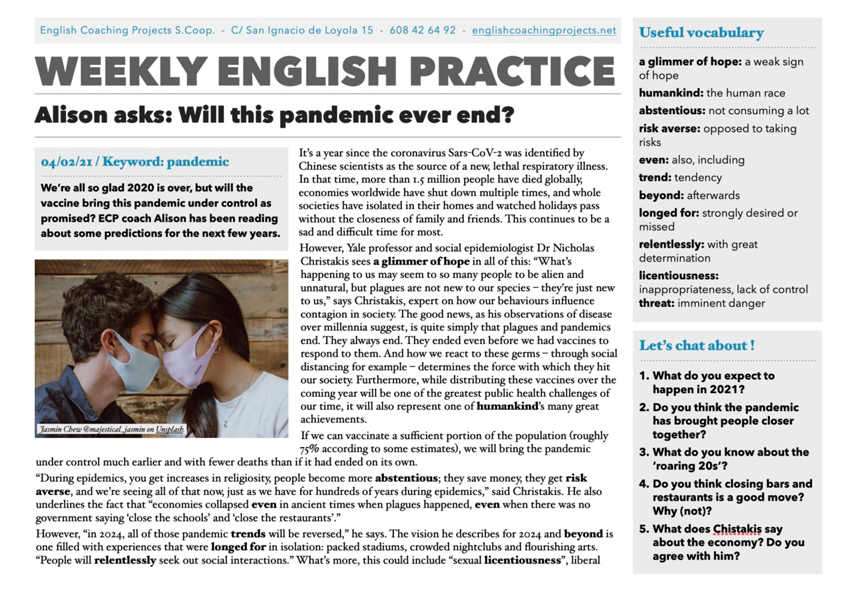Alison asks: Will this pandemic ever end?
04/02/21 / Keyword: pandemic
Will the vaccine bring this pandemic under control as promised? ECP coach Alison has been reading about some predictions for the next few years.
Click HERE to download the Weekly English Practice as a PDF.
Useful vocabulary
a glimmer of hope: a weak sign of hope
humankind: the human race
abstentious: not consuming a lot
risk averse: opposed to taking risks
even: also, including
trend: tendency
beyond: afterwards
longed for: strongly desired or missed
relentlessly: with great determination
licentiousness: inappropriateness, lack of control
threat: imminent danger
Listen to the audio and read the text (refresh the page if it’s not visible).
We’re all so glad 2020 is over, but will the vaccine bring this pandemic under control as promised? ECP coach Alison has been reading about some predictions for the next few years.
It’s a year since the coronavirus Sars-CoV-2 was identified by Chinese scientists as the source of a new, lethal respiratory illness. In that time, more than 1.5 million people have died globally, economies worldwide have shut down multiple times, and whole societies have isolated in their homes and watched holidays pass without the closeness of family and friends. This continues to be a sad and difficult time for most.
However, Yale professor and social epidemiologist Dr Nicholas Christakis sees a glimmer of hope in all of this: “What’s happening to us may seem to so many people to be alien and unnatural, but plagues are not new to our species – they’re just new to us,” says Christakis, expert on how our behaviours influence contagion in society. The good news, as his observations of disease over millennia suggest, is quite simply that plagues and pandemics end. They always end. They ended even before we had vaccines to respond to them. And how we react to these germs – through social distancing for example – determines the force with which they hit our society. Furthermore, while distributing these vaccines over the coming year will be one of the greatest public health challenges of our time, it will also represent one of humankind’s many great achievements.
If we can vaccinate a sufficient portion of the population (roughly 75% according to some estimates), we will bring the pandemic under control much earlier and with fewer deaths than if it had ended on its own.
“During epidemics, you get increases in religiosity, people become more abstentious; they save money, they get risk averse, and we’re seeing all of that now, just as we have for hundreds of years during epidemics,” says Christakis. He also underlines the fact that “economies collapsed even in ancient times when plagues happened, even when there was no government saying ‘close the schools’ and ‘close the restaurants’.”
However, “in 2024, all of those pandemic trends will be reversed,” he says. The vision he describes for 2024 and beyond is one filled with experiences that were longed for in isolation: packed stadiums, crowded nightclubs and flourishing arts. “People will relentlessly seek out social interactions.” What’s more, this could include “sexual licentiousness”, liberal spending, and a “reverse of religiosity”. He predicts we will witness a second “roaring 20s”, just as after the 1918 flu pandemic.
Needless to say, there is still work to be done. The coming year will test the world’s endurance in continuing to social distance, hand-wash, wear masks and avoid crowds.
“Our world has changed; there’s a new deadly pathogen that is circulating. We’re not the first people that have had to face this threat, and a lot will be asked of us,” concludes Christakis. “And we’re just going to have to be grown up about it.”
Adapted from theguardian.com by ECP coach Alison Keable
Let’s chat about the pandemic.
- What do you expect to happen in 2021?
- Do you think the pandemic has brought people closer together?
- What do you know about the ‘roaring 20s’?
- Do you think closing bars and restaurants is a good move? Why (not)?
- What does Chistakis say about the economy? Do you agree with him?

